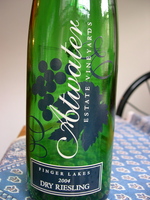 There’s no doubt about it — my favorite white varietal is riesling. Of course, I don’t like every one I try. They need to have that that zing of acidity that ‘forces’ me into another sip (and another and anoter and another).
There’s no doubt about it — my favorite white varietal is riesling. Of course, I don’t like every one I try. They need to have that that zing of acidity that ‘forces’ me into another sip (and another and anoter and another).
New York’s Finger Lakes region is pretty well known for it’s riesling, with Dr. Konstantin Frank probably the most well known outside of the state. This relatively winter-hardy varietal has done very well in the region becuase it ripens even in the cool Finger Lakes climate and because good wines can be made from riesling that isn’t at full ripeness.
In many ways, the Finger Lakes region is the perfect place to grow U.S. riesling. In California riesling is often grown in cooler central coast areas…they often lack the backbone acidity because night time temperatures aren’t cool enough. In Oregon and Washington State, they have the cool temperatures at night, but the daytime temperatures often rise higher than they do in central New York.
Atwater Estate Vineyards is located on the south east shore of Seneca Lake and they are starting to get some press for their top-flight riesling.
I was first introduced to Atwater by Rich Pisacano, owner of Roanoke
Vineyeards on Long Island’s North Fork and vineyard manager at Wolffer
Estate in the Hamptons. Atwater’s winemaker, Vincent Aliperti, used to
work at Wolffer Estate…which is where he and Rich met.
Despite riesling’s success in the Finger Lakes, quality still varies
greatly from location to location and winery to winery. Even in a
relatively small region like the Finger Lakes, riesling from different
sides of different lakes definitely taste different. I guess we can
chalk that up to rieslings propensity for picking up difference in soil
conditions.
I actually have several Atwater whites that I plan to taste and write about in coming weeks, but last night we enjoyed their 2004 Dry Riesling ($15) with homemade Greek chicken on pita. Only 377 cases were produced and it’s sold out. Luckily, I’ve got a couple bottles left.
Eyes: Crystal clear and extremely light yellow
Nose: Extremely aromatic with mineral, stone fruit and faint citrusy aromas
Tongue: Definitely in a trocken (dry) style, it’s light
bodied, super crisp and refreshing with flavors that grow and change as
the wine warms a little (remember, don’t over chill!). They start with
lime and other citrus…but then become richer with apricot and ripe
peach flavor with a honey-mineral finish.
Price: $15
Lenn’s Grade: B+/A-
Nena’s Grade: A+
